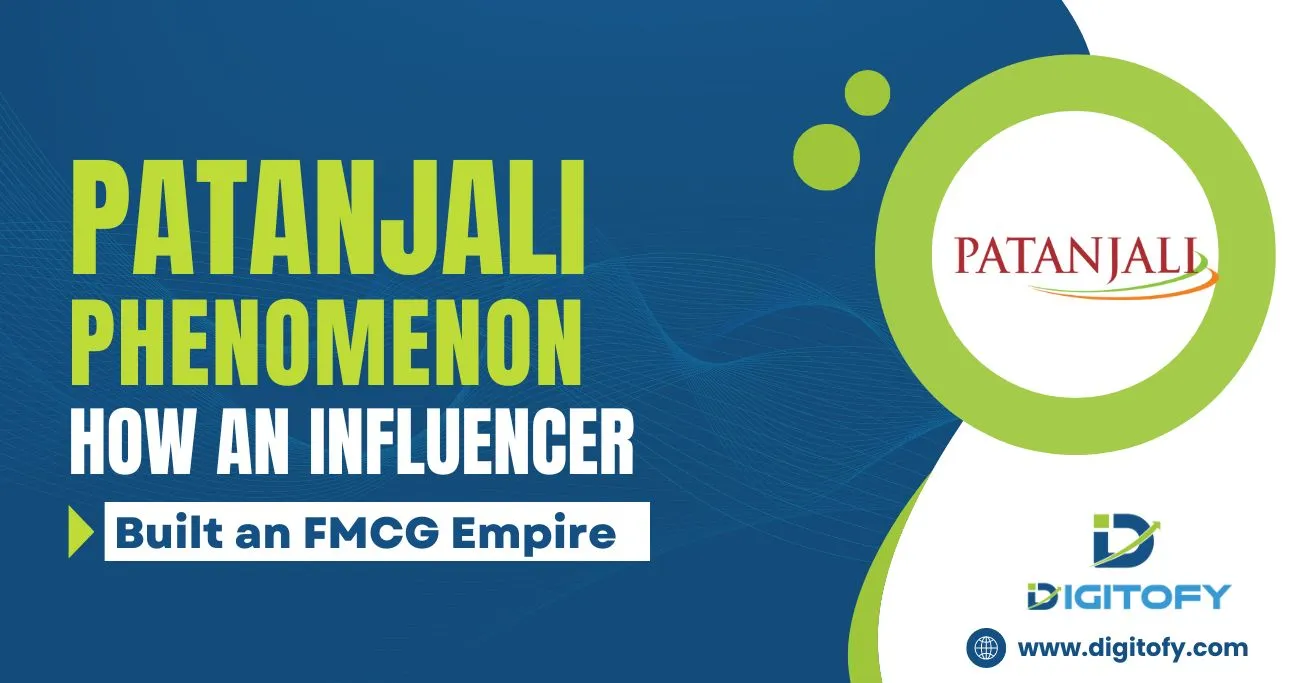The Patanjali Phenomenon: How an Influencer Built an FMCG Empire
Over the past decade, Patanjali Ayurved has remarkably disrupted the FMCG sector in India with its portfolio of Ayurvedic and natural products. Founded by Baba Ramdev and Acharya Balkrishna, the company has managed to compete head-to-head with the most giant multinational corporations. We look closer at the ingredients behind Patanjali’s inspirational success story.
About Patanjali
Patanjali Ayurved was established in 2006 by yoga guru Baba Ramdev and his associate Acharya Balkrishna with the main goals of promoting Ayurveda, the ancient Indian system of medicine, and producing affordable consumer packaged goods based on natural ingredients. Starting with just one small pharmacy in Haridwar, the company manufactures over 500 products across 20 major categories, including personal care, food, home care, healthcare, and more.
Clocking exponential growth year-on-year, Patanjali has transformed into a mammoth empire with an astounding valuation of over $7 billion, per recent estimates. According to company data, FY 2020-21 saw the brand generate close to $1.2 billion in revenues. As per IQVIA data, Patanjali recorded a 7% market share in India’s total FMCG market and has become the country’s fastest-growing FMCG company, surpassing major corporations like Dabur, Emami, and Marico.
What’s New with Patanjali?
Marketing Strategy Shift
Marking a shift from its earlier controversial and radical positioning, Patanjali has adopted a subtler promotion strategy with rational appeal. While yoga guru Baba Ramdev was earlier the visible face of all marketing initiatives, the brand now uses professional ambassadors like Olympic medalist Saikhom Mirabai Chanu and celebrity endorsements to connect with today’s younger consumers. We still see Baba Ramdev associated but playing a more advisory role focusing on R&D and ideological direction.
Also, Watch Our YouTube Shorts Video on: Day 11 – No One Can Copy Baba Ramdev’s Marketing Strategy for “Patanjali” That Shook FMCG Industry
Getting to Know the Patanjali Customer
Patanjali primarily caters to second-rung rural and semi-urban consumers and price-sensitive sections in urban markets.
Demographics
The largest demographic segment is typically middle-aged adults between 35-55 years from middle-income groups. However, market surveys over the last few years show increasing popularity across all age brackets, including youth and kids, establishing Patanajali’s appeal as a mainstream brand. The brand also has a reasonably equal male-to-female customer ratio.
Psychographic Profile
Studies indicate that Patanjali loyalists believe strongly in natural living, prefer Ayurvedic and herbal products as gentler and safer alternatives than artificial formulations, and deeply respect Indian culture and ethos. They hold favorable opinions about Baba Ramdev’s public persona, viewing him as an inspiration and credible influencer.
Buying Behavior
For most buyers drawn to the mass-premium pricing, Patanjali delivers affordable access to natural, Ayurvedic products from a familiar homegrown brand. Instead of experimental shopping, regular users exhibit repeat purchase habits across categories, stocking up frequently on Patanjali staples for household consumption.
Product Strategy
Patanjali has leveraged Baba Ramdev’s expertise in Yoga and Ayurveda to position itself as an authentic and natural brand recrafting ancient formulations and ingredients into contemporary packaged formats under his supervision.
Core Focus on Ayurveda
Each product highlights its specialized Ayurvedic properties, with elements like Amla, Tulsi, Ashwagandha, Shikakai, and Bhringraj recurring appearances across variants. Consumers seeking chemical-free alternatives find reliable solutions in these traditional recipes.
Emphasizing Natural Appeal
Whether skin care, food staples, or home care – Patanjali has cashed in on a growing preference for non-artificial constituents with selections featuring naturally derived, botanical components. Products ranging from toothpaste hair oil to besan flour and cow ghee flaunt nature-based, safe contents.
Value-for-Money Pricing
Despite making no compromise on ingredient quality with extensive R&D investments, Patanajali’s effective fiscal planning allows it to offer premium Ayurvedic quality at highly affordable mid-market prices unmatched by competing organic, natural brands.
Pricing Tactics
Discount and Deal Offerings
Patanjali regularly announces major promotional campaigns like Patanjali Mega Fest or loyalty programs, enticing buyers with instant discounts, cashback, and reduced prices across bestsellers, creating a high spike in sales.
Bulk Saving Bundles
Catering to its core small town and rural buyer base, Patanjali incentivizes bulk purchases for joint families by packing quantity combo offers on staples like rice, flour, and oil, making monthly stocks cheaper.
Low-Cost Leadership
Beat pricing being integral to product ideology, Patanjali’s operational efficiency significantly helps minimize overheads and wastages to let it price products far lower than rivals without impacting quality. This ensures excellent value, especially for price-sensitive segments.
Distributing Far and Wide
Rapid Market Reach Expansion
Patanjali established its owned outlets at breakneck speed to make availability universal, leveraging Baba Ramdev’s yoga camps to access devotees across non-metros for retail access and product sampling & feedback.
Strategic Location Leverage
Getting prime spots in brand ambassador Baba Ramdev’s yoga shivirs and nearby host locations allowed Patanjali stores to tap into motivated target groups through captive footfall, allowing the fastest B2C channel development.
Robust Supply Chain Scale-Up
Patanjali invested big in the end-to-end supply chain, keeping costs low through economies of scale and direct access from soil to shelf, from its botanical gardens manufacturing plants to countrywide storage warehouses.
Promoting the Patanjali Persona
Ramdev: The Face of The Brand
Unlike competitors relying on celebrity ads, Patanjali could seamlessly blend promotion around the product lineup and Baba Ramdev’s personality with his mass following, established authority in natural healing space, and Indian ethos evoking imagery and content that deeply resonated with the TG psychograph.
Leveraging Devotee Connect
Patanjali plugged into Baba’s existing follower base of 20 million+ Indians familiar with his online and offline identity for years, allowing emotional bonding with him to transfer onto the brand through vicarious blended publicity across his yoga sessions, shows, and retail presence.
Digital Media Play
While Baba Ramdev was a tangible brand ambassador across grassroots channels, Patanjali invested early with dedicated YouTube channels and websites, sharing spiritual discourses, yoga tutorials, and direct product promotion for deeper audience engagement.
Giving MNCs a Run for Their Money
- MNC FMCG Giant I – Hindustan Unilever This British-Dutch corporation dominates India’s FMCG market through flagship brands like Lifebuoy, Surf Excel, Lux, Brooke Bond, Vim, Kissan, and more. But many product lines now face stiff competition from Patanjali’s herbal, Ayurvedic variants packaged as economical alternatives.
- MNC FMCG Giant II – Procter & Gamble Global American MNC P&G is another market leader thanks to trusted household names like Ariel, Tide, Whisper, Olay, Vicks, etc. But Patanjali’s value-based positioning has made a dent in market share earlier, totally dominated by P&G’s premium-priced offerings.
- Leading Ayurvedic Competitor – Dabur India Dabur boasts a legacy of over 135 years since 1884 as a pioneering herbal and Ayurvedic company in India. But Patanjali, through its scale and pricing edge, managed to achieve in 10 years what Dabur couldn’t in over a century of operations, emerging as the new dominant Ayurvedic brand.
The Patanjali Success Doctrine
Streamlined Product Innovation
With a vast R&D facility and in-house labs at the Food Park facility integrating modern research with Ayurvedic wisdom, Patanjali systematically introduces new products across gaps matching ground needs.
Lean and Efficient Go-to-Market
Through owning its entire backend, from manufacturing to last-mile logistics, Patanjali holds control over the complete process, optimizing supply chain costs and flexibility, allowing faster scale-up and maximum retail margins.
The Baba Ramdev Magnet
Patanjali’s unique symbiotic partnership with brand ambassador, ideator, and stakeholder Baba Ramdev is a secret weapon for creating deep consumer connections. His mass credibility and following build perception equity unmatched by ordinary celebrity endorsements.
The Secret Ingredient: Influencer Marketing with Baba Ramdev
Unrivaled Reach and Recall Value
Baba Ramdev’s established visibility as a practicing yoga guru and spiritual leader for two decades, with millions following his shows and shivirs, ensures instant high decibel amplification for Patanjali’s marketing communication efforts, rapidly driving awareness and adoption.
Equity of Trust and Goodwill
By aligning as a philosophical extension of Ramdev’s public service platform, Patanjali products come qualified with his hard-won authority, lending perceived genuineness, safety, and care for user wellbeing – attributes no rival brand can emulate through conventional tactics.
Heart Share Connect
Unlike commercial brand ambassador partnerships, Baba Ramdev derives no monetary benefit from his life, work, and image, which are completely embedded into Patanjali’s mission. This invocation of a higher cause allows uniquely emotional and ethical consumer bonding beyond material transactional delight.
Conclusion
In an incredibly short period, Patanjali has come to lead the disruption of India’s FMCG landscape through its unique amalgamation of traditional Ayurvedic formulations and influencer-led branding, allowing it to threaten even global biggies. With Baba Ramdev’s vision and early-mover advantage in captured Ayurveda space, Patanjali continues on an ambitious path to expand its portfolio reach and emerge as a formidable challenger brand within the top league, commanding immense buyer loyalty across Bharat.
Key Takeaways
- Align with credible mass influencers, allowing captive access to a loyal follower base.
- Keep the core focus on leveraging traditional strengths and IP instead of diversification.
- Integrate research with culture and belief systems native to your core target group.
- Control backbone elements like sourcing, production, and distribution for cost efficiency

.webp)

